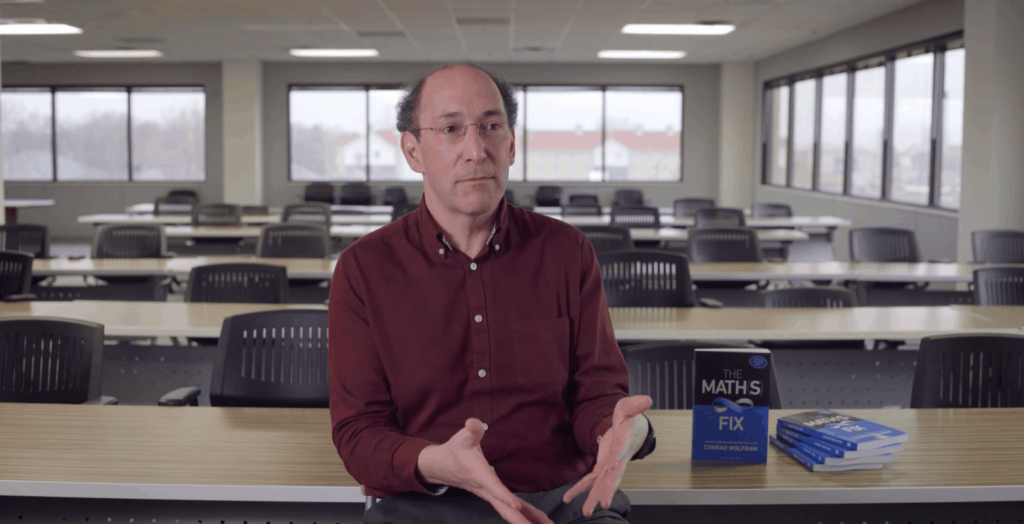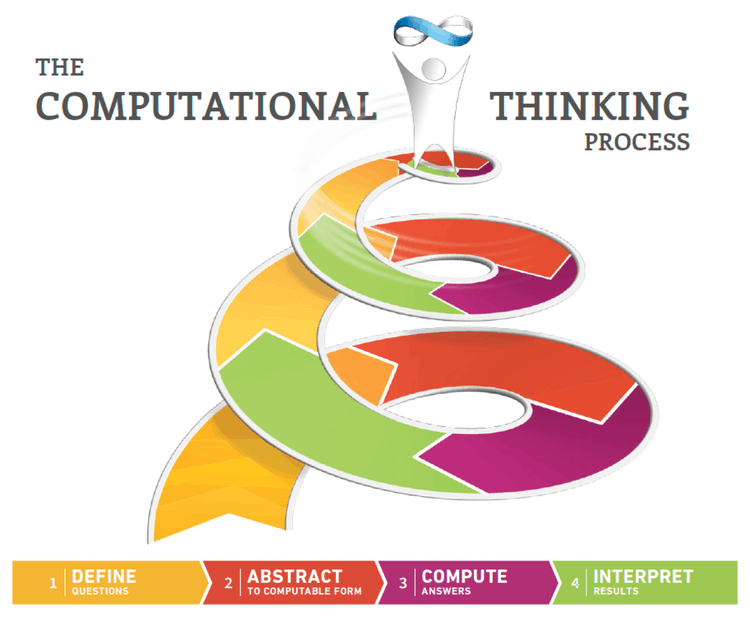Conrad Wolfram on Computational Thinking

Schools around the world teach calculation. But computers do that far better and faster than humans. There’s no need to add fractions, teach long division or factor polynomials–let computers do that. Instead, “humans should learn to use computing tools to address increasingly complex problems.”
That’s the conclusion of Conrad Wolfram, Strategy Director at Wolfram Research, the world’s leading computational resource, as outlined in his new book, The Math(s) Fix: An Education Blueprint for the AI Age.
“The maths taught around the world today does not fit how it is used in the real world. Computation technology is more accessible than ever before, but no curriculum in the world assumes it exists. Instead, it is focussed on the mechanics of hand calculation, rather than the essence of real-world maths,” said Wolfram.
Instead of torturing kids with memorizing and executing hand calculation procedures, we should be teaching computational thinking. Wolfram outlines a four-step process that can be used across the curriculum: define the questions, abstract them to computable form, compute answers, and interpret results.
Wolfram makes the case that computation thinking is required in all fields and in everyday living–and that no one does calculations by hand. We’re living in what Wolfram calls a “computational knowledge economy” where the education question is, “How to prepare young people for a hybrid human-machine world?” In this new age, it’s not what you know, “it’s what you can compute from knowledge,” argues Wolfram.
The universally accepted approach to teaching mathematics is driven by an assessment of abilities to perform calculation–and it is simply not relevant to any field today.
In every STEM field, the order of introduction has been driven by the complexity of the calculation. Instead, argues Wolfram, we should introduce increasingly complex problems. For example, given the power to compute, it’s quite possible to introduce 10-year-olds to the idea of the rate of change (a derivative) and area under the curve (an integral) without teaching the steps of calculation.
Instead of racking up grades and test scores based on worksheets of hand calculation, Wolframs see math education as real-world learning, “open-ended projects, reports, presentations, real-time meetings, decision-taking…are all represented…and all provide data for assessment. Rather than being judged, after years of study, by one grade or mark based on a few hours of exams, you carry with you a complete computational portfolio (like an art portfolio) of your work, alongside a computable dataset representing all your educational achievements.”
Wolfram argues for a new core computational subject that “is built on actual problems solved by real people in the real world with today’s technology. A computer-based maths curriculum should be built around real-world requirements such as data science, information theory, and modeling.”
What do we do now?
You may be wondering, If you’re a math teacher, how can we fix the problem without getting fired?
If you’re a teacher in a state preoccupied with grade-level proficiency in the calculation based on an end of year standardized test, you’ll need to add computational thinking where you can and encourage your colleagues to do the same.
Wolfram suggests you “Download and display the Computational Thinking Poster. Use it to introduce the four-step process as a method of quantitative problem-solving. No matter what the age, practice the process on every problem encountered.”
Teachers can use computational thinking across the curriculum. Wolfram suggests giving students open-ended projects and supporting progress through the four steps.
With inspiration from Carnegie Mellon University, the South Fayette School District, south of Pittsburgh, is a great example of integrating computational thinking across the K012 curriculum.
You can also add after school activities and clubs that promote computational thinking. The Wolfram Foundation is sponsoring AI Leagues, AI Camps and AI Arts & Science Fairs.
To change your state or national standards, you’ll need to start advocating for a new set of priorities and new ways of assessing progress. Start by joining Wolfram’s campaign “The Maths Fix Campaign for Core Computational Curriculum Change.” The five principles are shown below.
Wolfram joins leading math educator Jo Boaler and economist Steven Levitt as leading voices advocating for change.
“Put data and its analysis at the center of high school mathematics.” That’s the conclusion of a paper by Boaler and Levitt. They recommend that “every high school student should graduate with an understanding of data, spreadsheets, and the difference between correlation and causality.”
Boaler has been advocating for updated California math standards. Check out the Data Science topic on YouCubed.
This is an important equity issue. Our obsolete math standards, instruction, and assessments keep millions of low income and minority students out of college and are a barrier to high wage employment. Conversely, equipping young people with the ability to take on complex problems with smart tools will equip them for a lifetime of contribution.
Give a copy of The Math(s) Fix to your local school superintendent and start a community conversation about how you can make education more relevant and equitable.
Key Takeaways:
[1:27] About Wolfram’s family background with math.
[2:41] What the Wolfram language is.
[3:47] About this new era we’re in today (what Wolfram considers the ‘AI age’ or the ‘fourth industrial revolution’), especially with regards to computation.
[8:42] The two big ideas in The Math(s) Fix: the importance of computational thinking across the curriculum and that we should begin to utilize the powerful supercomputers in our pockets rather than spending all our time in school learning to hand-calculate.
[12:20] Defining computational thinking and why it is becoming increasingly important in every field.
[17:43] Why the focus on hand-calculation in math(s) education is actually detrimental for learners.
[24:24] Advertising opportunities available through Getting Smart.
[24:55] Conrad elaborates on his idea of teaching machine learning to students starting in primary school.
[28:37] Lightning round! Conrad answers: Is it still useful to memorize the times table? What about fractions and proportionality? Long division? Factoring polynomials?
[35:04] Is teaching computational thinking more challenging than the traditional rote memorization way of teaching math(s)?
[41:16] Advice for math(s) teachers on how to bring computational thinking into their teaching.
[44:56] About The Maths Fix Campaign for Core Computational Curriculum Change (MFC5).
[48:05] Be sure to check out Conrad’s book, The Math(s) Fix: An Education Blueprint for the AI Age!
In the interview, Tom referenced a few page numbers from a review copy. As a result, there may be page number inconsistencies with the final edition.
Mentioned in This Episode:
Conrad Wolfram
Wolfram Research
The Math(s) Fix: An Education Blueprint for the AI Age, by Conrad Wolfram
Wolfram Mathematica
Wolfram Language
The Maths Fix Campaign for Core Computational Curriculum Change (MFC5)
Getting Smart Podcast Ep. 239: “Jo Boaler on the Limitless Mind and Learning Math That Matters”
For more see
- Stop Calculating and Start Teaching Computational Thinking
- Podcast: Jo Boaler On the Limitless Mind and Learning Math That Matters
- Swap Algebra 2 for Data Science, Get a 1-Point Bump in GDP
- Bad Bargain: Why We Still Ask Kids to Factor Polynomials and How We Fix It
- Advancing Computational Thinking Across K-12 Education
Stay in-the-know with innovations in learning by signing up for the weekly Smart Update.









0 Comments
Leave a Comment
Your email address will not be published. All fields are required.